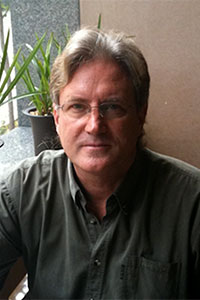Chess maestro Garry Kasparov has made a small but meaningful contribution to free speech in journalistic circles by challenging the widely-held taboo about invoking Hitler's name as a cautionary warning.

A protester sits, prays and asks for compassion in front of a phalanx of riot police during an attempt to seize back an anti-government protest site on the holy Makha Bucha Day. Prakrisana Jantawong
Anticipating a predictable avalanche of knee-jerk responses negating his argument comparing Vladimir Putin's handling of the Sochi Olympics to Hitler's handling of the Berlin Olympics of 1936, Kasparov made a small but important point: "Even Hitler himself wasn't always Hitler."
Before Hitler was Hitler, Adolf was just another Adolf. Even if it is taken as a given that Hitler at his worst was the worst tyrant of his time, it does not follow that looking for Hitler-like traits in current leaders is without foundation, nor is it pointless to suggest that certain manipulative populist politicians are sufficiently cold-hearted, ego-driven and skilled enough in methods used by the Nazis that they would turn their country into a private fiefdom if they could get away with it.
Hitler had once been a baby, a little boy, a student, an ambitious provincial, a loser, a loner, a devourer of crackpot ideas who became a charismatic beer hall speaker and organiser of a fringe movement long before he ever won an election or his name became synonymous with evil personified.
If there is a lesson from the rise of Hitler and his Nazi political machine it is that the capacity for evil needs to be recognised, curbed and contained in a timely manner; it must not be allowed to flower.
Recent history provides shocking examples in which attractive civilised nations morphed into abhorrent barbaric states. The cosmopolitan and culturally rich societies of Taisho Japan and Weimar Germany were both replaced by fascist regimes within a decade.
It's not an indictment of national DNA; it could happen anywhere.
That's why everyone, everywhere, has to be vigilant. That's why America, despite its lip service to elections and the transformative powers Silicon Valley and Hollywood, has to stem the tide of creeping authoritarianism, as epitomised by intrusive spying and over-reliance on guns and drones.
That's why Thailand, a tropical paradise to the world's tourists, a Buddhist beacon in a troubled world, has to be on guard against allowing a power-hungry billionaire from taking remote control of the economy and critical government functions.
Laos and Cambodia were routinely described as gentle and idyllic in the old guide books before they were torn apart by war. In the case of the Khmer Rouge, a political force comparable to Nazism in its paranoid brutality ruined the country.
The rise of a charismatic leader begs hard questions; what are the mechanisms that make it possible for one person to enjoy such power and influence over fellow citizens?
How can otherwise sensitive and sensible people allow themselves to be led astray by a self-serving, greedy leader who is quick to use, abuse and discard "the people" like a worn-out boat once he crosses the river and starts to climb the mountain of ultimate power?
The process is well-documented in the case of Germany; the Nazis used elections to end all elections, they used propaganda to smother alternative points of view, they used storm troopers and vigilantes to create a spell of shock, awe and fear, and they demolished traditional checks and balances until they had free run of the country.
In reading the recently re-published, Hitler: The memoir of a Nazi insider who turned against the Fuhrer by Ernst Hanfstaengl, one gets a ringside view of Hitler before he became Hitler. Honest to a fault, the author admits he was dazzled by the Fuhrer's oratory and audacity, even if the man was homely and lonely and the ideas being expressed were a muddle of crackpot schemes and shallow, callous prejudice.
Reading about how a Harvard-educated historian and musician fell for the fuhrer sheds light on how people fall for populist leaders. If Hanfstaengl has it right, the folksy charm, the stirring of hope and the skillful use of propaganda blind people to the diabolical side of things hidden in plain sight.
Looking back, if there were any humane way to shut down Hitler's political programme before it became unstoppable, would that not be a good thing?
There is no Hitler in Thailand today, of course, but tried and tested techniques of Nazi-style populism, propaganda, manipulation and control are evident and a cause for concern.
Seeing signs of this, an embattled opposition is crying foul, pointing to the machinations of an ambitious political clan headed by a cult-like leader. The stakes are high. Police storm-troopers in service of the clan have already been deployed, carrying heavy-duty weapons, poised to enforce the ruling clique's choke-hold on power.
Fortunately, rank and file red shirts are already showing signs of seeing through the phony populism; the Yingluck government's sleazy rice-pricing gamble, hoping to make a cash killing off the sweat and toil of rice farmers, puts paid the myth that Pheu Thai is a party for the poor.
Nobody can say for sure where Thailand is going these days as divisive currents run wild and vested interests vie for power.
But the runaway train of ambition and greed of a powerful clan appears to have been momentarily derailed in Bangkok streets and plazas thick with peaceful protesters.
The image of a lone woman on the pavement reciting Buddhist mantras in front of a phalanx of riot police decked out in storm-trooper gear alights a tender hope, that right still has a chance to triumph over might.
She may be a dreamer, but she's not the only one.
Philip J Cunningham is media researcher covering Asian politics.
